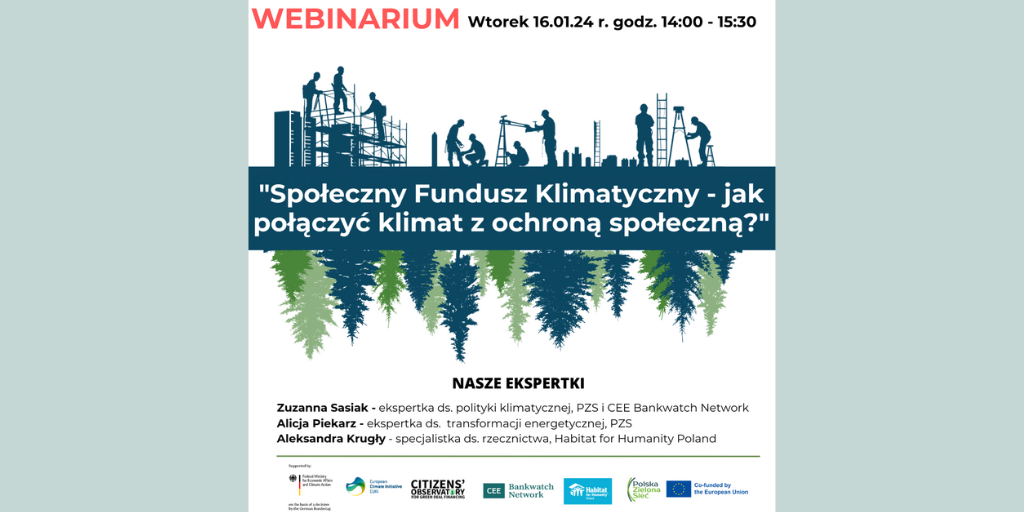
On 16 January 2024, the Polish Green Network and the Habitat for Humanity Poland held a webinar ‘Social Climate Fund – how to link climate and social protection?’. The topic of the meeting was the Social Climate Fund, which is one of the elements of the new iteration of EU climate policy and will be available to Poland and other EU member states starting in 2026.
At the outset, participants had the opportunity to learn about the context in which this new financial instrument appears on the horizon of available funds and support measures. In 2027, the European Union will expand the currently functioning European Emissions Trading Scheme (ETS) to include new areas generating greenhouse gas emissions – construction and road transport (this will be known as ETS2). As ETS2 will ultimately translate into increased costs for users of buildings and transport, a Social Climate Fund will be introduced to make it easier for the most vulnerable groups – individual households and small/medium businesses – to switch to low- or zero-carbon technologies without incurring high costs to do so. As Zuzanna Sasiak of Polish Green Network / CEE Bankwatch Network, who led this part, said: – ‘The EU is aware of the potential social costs that the launch of ETS2 may generate, hence the plan to introduce a Fund with quite a large budget (more than EUR 11 billion for Poland). However, its disbursement needs to be planned carefully because after a few years, the Fund will end, and the rules resulting from ETS2 will remain.”
The second part of the webinar focused the audience’s attention on the practical aspects of implementing the Fund in Poland. According to EU requirements, it is necessary to draw up a Social Climate Plan to specify how the country intends to use the Fund’s resources. The European Commission must approve the plan and receive the document no later than June 2025. If it is to be prepared on time and, above all, in accordance with the objective, work on the document should begin in the coming months. In the meantime, the Polish government must decide how to organise the work process effectively – which ministry should be responsible for it, how to make the process interdisciplinary, and how to plan investments and combine them with possible direct support. In turn, potential stakeholders (local and regional authorities, social organisations, businesses) should look at their preparedness level in terms of data collected, conclusions and recommendations. – The Social Climate Fund is an opportunity to support vulnerable groups while solving their energy problems. The prerequisite is a well-prepared Social Climate Plan that includes a wide range of stakeholders.” – Alicja Piekarz from the Polish Green Network pointed out.
The third part, hosted by Aleksandra Krugły from the Habitat for Humanity Poland foundation, was devoted to the issue of using the Social Climate Fund to combat energy poverty in Poland. Fuel poverty is a problem affecting more than 11% of households in our country, where at least two of the following factors most often intersect: low income, high energy costs and low energy efficiency of the building occupied. As a shielding instrument, the Fund is, in principle, intended to support people in vulnerable groups who will be most affected by the extension of the ETS to buildings and road transport. At the present juncture, even before Poland’s EU-record (18%) content Fund allocation is filled, i.e. with a set of dedicated reforms and investments in the form of a Social Climate Plan, it is the right time to diagnose needs in a participatory and in-depth manner among stakeholders from all sectors.
The final section was dedicated to discussing the perceived challenges and needs at this stage. Attention was drawn to the need to monitor government action and how to communicate knowledge about the Social Climate Fund to a broader audience. Regarding the issue of fuel poverty, participants agreed that it is helpful to use and scale up good practices (e.g. co-housing, Social Tenancy Agencies, energy communities), also pointing out the need to disseminate knowledge about available solutions.
The Social Climate Fund is a topic that still needs to be publicised in Poland, and the Polish Green Network and Habitat for Humanity Poland webinar was one of the first events dedicated to this issue. We invite you to follow our website, where we will soon invite you to another meeting about the Fund and the possibilities of its effective use.
We noticed a great diversity among the webinar participants – there were representatives of local authorities, local associations, individuals. Interestingly, there were also representatives of organisations we know of that work in the field of climate and environmental protection. All participants emphasised that the topic was new to them and that they were getting their first information on the subject during our event. We, for our part, in addition to general information about the SCF, placed particular emphasis on an open conversation about the envisaged process of working on the Social Climate Plan. Our aim was to get participants interested in the process and to show them that the preparation of the Plan will be impossible without extensive consultation with many stakeholders on the social side. There were 32 people present at the webinar.
A recording of the webinar is available here.

